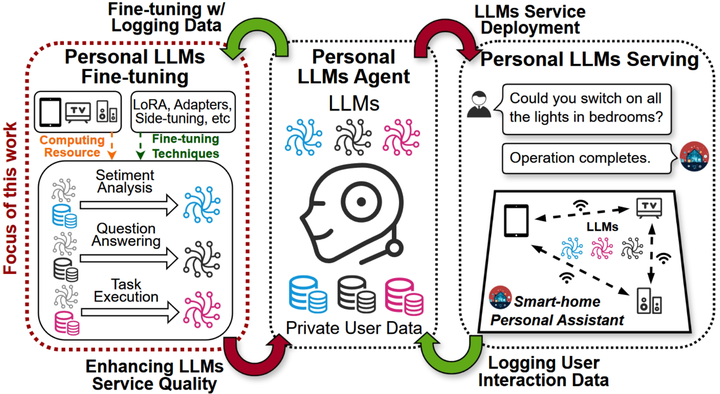Pluto and Charon: A Time and Memory Efficient Collaborative Edge AI Framework for Personal LLMs Fine-Tuning
 PAC Overview
PAC Overview
Abstract
Large language models (LLMs) have unlocked a plethora of powerful applications at the network edge, such as intelligent personal assistants. Data privacy and security concerns have prompted a shift towards edge-based fine-tuning of personal LLMs, away from cloud reliance. However, this raises issues of computational intensity and resource scarcity, hindering training efficiency and feasibility. While current studies investigate parameter-efficient fine-tuning (PEFT) techniques to mitigate resource constraints, our analysis indicates that these techniques are not sufficiently resource-efficient for edge devices. Other studies focus on exploiting the potential of edge devices through resource management optimization, yet are ultimately bottlenecked by the resource wall of individual devices. To tackle these challenges, we propose Pluto and Charon (PAC), a time and memory efficient collaborative edge AI framework for personal LLMs fine-tuning. PAC breaks the resource wall of personal LLMs fine-tuning with a sophisticated algorithm-system codesign. (1) Algorithmically, PAC implements a personal LLMs finetuning technique that is efficient in terms of parameters, time, and memory. It utilizes Parallel Adapters to circumvent the need for a full backward pass through the LLM backbone. Additionally, an activation cache mechanism further streamlining the process by negating the necessity for repeated forward passes across multiple epochs. (2) Systematically, PAC leverages edge devices in close proximity, pooling them as a collective resource for in-situ personal LLMs fine-tuning, utilizing a hybrid data and pipeline parallelism to orchestrate distributed training. The use of the activation cache eliminates the need for forward pass through the LLM backbone, enabling exclusive fine-tuning of the Parallel Adapters using data parallelism. Extensive evaluation based on prototype implementation demonstrates that PAC remarkably outperforms state-of-the-art approaches, achieving up to 8.64× end-to-end speedup and up to 88.16% reduction in memory footprint.